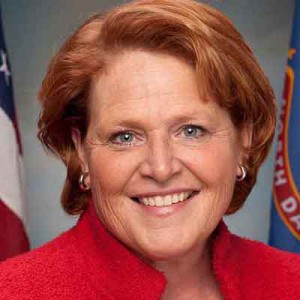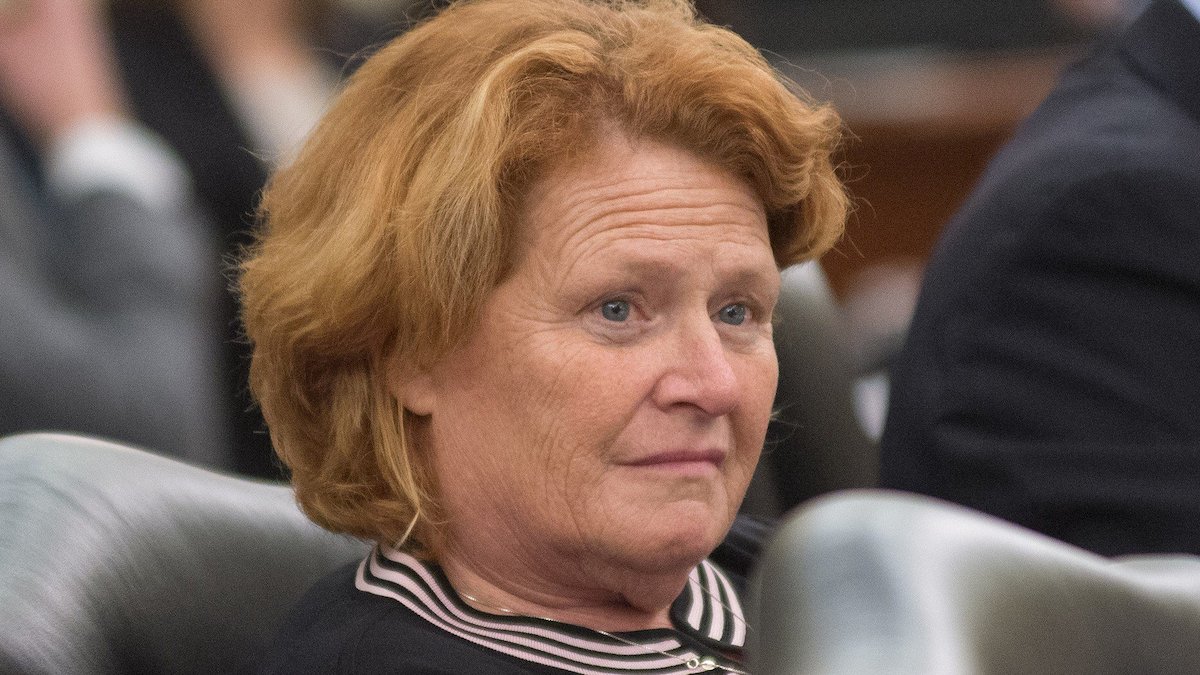Washington, D.C., Oct. 8 – RespectAbility, a nonprofit organization fighting stigmas and advancing opportunities for people with disabilities, has asked gubernatorial candidates on all sides of the aisle to fill out a questionnaire on disability issues.
Heidi Heitkamp is a current U.S. Senator for North Dakota. A Democrat, she has served since 2013. She is the first woman in North Dakota to be elected to a United States Senate seat. Previously she worked as the North Dakota Attorney General, and as an attorney for both the EPA and North Dakota’s Tax commissioner’s office. She faces off against Republican Rep. Kevin Cramer in November.
RespectAbility is nonpartisan and does not endorse candidates. The questionnaire is purely for educational purposes.
This is important for North Dakota’s 84,500 citizens with disabilities. Only 51.5 percent of the 39,700 working-age people with disabilities in Nevada are employed. Further, there are more than 14,000 youth with disabilities and each year a quarter of them will age out of school into an uncertain future.
According to a recent survey, 74 percent of likely voters have a disability themselves or have a family member or a close friend with disabilities. The upcoming elections and their results will have an impact on people with disabilities, so it is important to become familiar with the candidates’ thoughts on certain issues.
“Candidates for office ignore the disability community at their peril,” said former U.S. Representative and Dallas Mayor Steve Bartlett. Bartlett, who was a primary author of the Americans With Disabilities Act of 1990, is the chairman of RespectAbility.
RespectAbility is seeking answers from the campaign of Rep. Kevin Cramer, Heitkamp’s opponent.
We are presenting Sen. Heitkamp’s answers in full below.
 Question 1: What policies and actions do you support to reduce the stigmas of people with disabilities that are barriers to employment, independence and equality?
Question 1: What policies and actions do you support to reduce the stigmas of people with disabilities that are barriers to employment, independence and equality?
Answer: One of the best ways to reduce the stigmas surrounding people with disabilities in employment is to get people with disabilities working jobs and let them show people firsthand everything that people with disabilities have to offer a workplace. Strong enforcement of the Americans with Disabilities Act and programs to help connect people with disabilities to the job market would go a long way towards reducing the stigmas of surrounding people with disabilities.
Question 2: What is your record on improving the lives of people with disabilities, specifically in enabling people with disabilities to have jobs, careers or start their own businesses?
Answer: I have dedicated my career to representing all people, regardless of race, gender, religion, or disability. I will continue to do so as long as I represent North Dakota in the Senate. The issues that affect all people often have an outsized impact on people with disabilities. As I work in the Senate to fix many of the issues that plague us today, like affordable health care, housing, and domestic violence, I do so knowing that work remains to be done to fix these problems for people with disabilities, too.
Question 3: Do you have specific strategies for youth employment for people with disabilities? For example, what are your thoughts on apprenticeships for youth with disabilities?
Answer: The lessons I learned at my first jobs stay with me to this day. Those same experiences and lessons should be available to youth with disabilities. I am in favor of any program that helps youth with disabilities get into the job market at an early age.
Question 4: The jobs of the future will largely require post-secondary education. However, on average only 65 percent of students with disabilities complete high school and only seven percent complete college. What policies do you support to enable students with disabilities, including those from historically marginalized communities and backgrounds, to receive the diagnosis, individualized education plan (IEP) or 504 plan and accommodations/services they need to succeed in school and be prepared for competitive employment?
Answer: It will take an effort from all sorts of parties to ensure that we close the gap of people who graduate high school and people with disabilities who graduate high school. Families, teachers, school administrators must all work together to provide people with disabilities the same opportunity to graduate from high school, college, or a post-secondary education. This can’t be done with one group alone. It will be a group effort.
Question 5: Today there are more than 750,000 people with disabilities behind bars in our nation. Most of them are functionally illiterate and 95 percent of them will eventually be released. What are your views to ensure that individuals with disabilities who are incarcerated gain the skills and mental health supports that will enable them to be successful when they leave incarceration?
Answer: People who spend time in jail are already at a huge disadvantage when they are released. With the stigma of a criminal record on top of the stigma already placed on people with disabilities, these people are faced with a hill too steep for anyone to climb. We must reform our criminal justice system, and that includes making improvements to programs that help people with disabilities gain skills and mental health support once they are out of prison.
Question 6: People with disabilities are twice as likely to be victims of crime as those without disabilities. This includes the fact that both children and adults with disabilities are more likely to be victims of rape or sexual assault. They are also far more likely to suffer from police violence, partially because manifestations of disability can be misunderstood. How would you address these issues?
Answer: Dating back to my time as North Dakota’s Attorney General, I have worked to reduce rates of domestic and sexual violence. Victims of domestic violence are often some of the most vulnerable people in our population. One of the best ways we can reduce the rate of domestic violence against people with disabilities is by reducing the rate of domestic violence across the board. One of the first bills I voted for as a senator was to reauthorize and expand Violence Against Women Act. I don’t want to live in a world where we aren’t doing everything we can to eradicate domestic violence.
Question 7: How would you ensure that people with disabilities have access to healthcare and the benefits they need while enabling them with opportunities to work to the best of their capacities without losing the supports they need to live?
Answer: Providing affordable health care to North Dakotans has been a pillar of my time in the Senate. We must strengthen Social Security and Medicaid. We must keep insurance companies from charging premiums based on pre-existing conditions. These are the things I have fought for, and I will continue to fight for them moving forward.
Question 8: What are your thoughts on ensuring that people with disabilities have the option to live in their homes instead of institutions and still have the community attendant supports they need to live?
Answer: North Dakota, in particular the western half of the state, is no stranger to housing shortages. Affordable housing is one of life’s most basic need. People with disabilities often already have limited options, that is only exacerbated by general housing shortages. To the extent that Medicaid currently provides a disincentive for people with disabilities to find employment so that they can have a personal care assistant, I would support reforming Medicaid to change that.
Question 9: How would you advance innovations (i.e., assistive technologies, devices) that can help people with disabilities become more successfully employed, productive and independent?
Answer: Advances in technology are perhaps the best opportunity to empower people with disabilities in the workplace. We must ensure that people with disabilities have access to these technologies. A person’s financial situation should not prevent them from obtaining the technologies necessary to successful, productive, independent employment.
Question 10: Are your office, website and events accessible to people with disabilities? If yes, please describe.
Answer: I make efforts to ensure that I am accessible to all North Dakotans regardless of whether they have a disability. If any constituent has a problem accessing one of my offices, event, or my website, I will be happy to figure out an accommodation for them.
RespectAbility has asked all the candidates for governor on both sides of the aisle to complete the same questionnaire. We will share responses from additional campaigns as we receive them.
The RespectAbility Report is a nonpartisan political commentary on U.S. elections with a focus on disability issues. The RespectAbility Report first posed this down ballot questionnaire to candidates in 2016 while covering all of the 2016 Democratic and Republican candidates for president. Coverage of this and related issues can be found at http://therespectabilityreport.org/.
The RespectAbility Report is nonpartisan and does not endorse candidates.

Be First to Comment